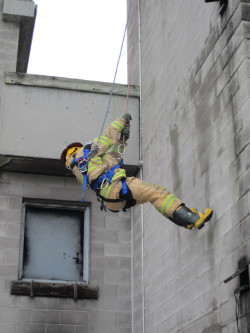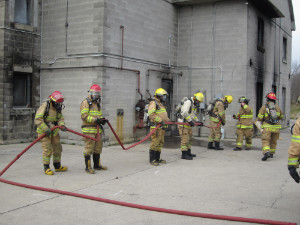Daina Mazutis is a Trudeau Scholar and a PhD Candidate at the Richard Ivey School of Business. Her research focuses on the relationship between strategic leadership and corporate social responsibility.

"It was a life-changing experience"
"This was an unbelievable day"
"I will remember this for the rest of my life"
These were some of the strong feelings Ivey students expressed after participating in the first ever Ivey Leadership course staged with the help of the London Fire Department. On Wednesday, November 10th, thirty Ivey Executive Program participants had the once in a lifetime opportunity to gear-up as firefighters, run mock rapid rescue intervention drills, propel off a three story building and find their way in a pitch black obstacle course - all designed to highlight the importance of teamwork, communication and leadership. More importantly, the exercises, which required both physical and emotional strength, were deliberately planned so that students could reflect not only on the competencies required to accomplish important goals, but also on the critical role that leadership character and commitment play in organizational success.

In the aftermath of the financial crisis, researchers at the Ian O. Ihnatowycz Institute for Leadership identified the importance of character and commitment in guiding organizations through highly ambiguous, highly stressful situations (see Leadership on Trial report). The drills executed with the London Fire Department this week were one of the first direct implementations of the research results which stressed the importance of making character and commitment more salient in our work on leadership development. During the course of the day, the Ivey Executive Program participants thus had the chance not only to observe virtuous behaviour in action through the role modeling of exceptional firefighters, but also to reflect on their own character strengths or weaknesses which may have surfaced during the stressful simulations.
 By character, we mean the habitual qualities within individuals that either constrain or lead them to pursue particular goals. These qualities are often referred to as character strengths that can in turn be seen as displays of one or another of the virtues and can thus be observed in individual behaviour. For example, the virtue of wisdom is defined in the character strength of open-mindedness which can be observed through in behaviours such as critical thinking or judgement. The virtue of humanity can be defined in terms of the character strengths of love or kindness and observed in behaviours such as generosity, care and compassion.
By character, we mean the habitual qualities within individuals that either constrain or lead them to pursue particular goals. These qualities are often referred to as character strengths that can in turn be seen as displays of one or another of the virtues and can thus be observed in individual behaviour. For example, the virtue of wisdom is defined in the character strength of open-mindedness which can be observed through in behaviours such as critical thinking or judgement. The virtue of humanity can be defined in terms of the character strengths of love or kindness and observed in behaviours such as generosity, care and compassion.
The firefighter exercises were exactly the kind of unique opportunity to allow observation of these virtues, character strengths and behaviours in action. While it goes without saying that the firefighters themselves embody virtues such as courage, humanity and wisdom, it was exciting to witness the discovery of virtues such as temperance, transcendence and justice surface among the executives. After the particularly gruelling exercise of running into a 'burning' building to find and rescue two injured 'victims', many students remarked at how humbling the experience had been. Not only did they have to face their own fears and trust strangers, displaying the character strengths of bravery or vitality associated with the virtue of courage, but they spoke openly about defining moments of prudence and humility which are character strengths associated with the virtue of temperance, and of gratitude and appreciation which are character strengths associated with the virtue of transcendence.
It has to be said that the firefighters themselves where extraordinarily adept at assessing the situations and bringing to the forefront many of the crucial character and commitment elements of failed or successful exercises. In particular, they shared their practice of immediate scenario debriefing in which all members share in an open and honest manner, without rank - what worked, what didn't, what went wrong and what they could have done better. Without pointing fingers or assigning blame, the debriefing sessions allow firefighters to learn from each critical incident in a way that displays the character strengths of integrity, compassion, fairness, humility and humour - which are all reflections of the virtues of courage, humanity, justice, temperance, transcendence and wisdom.
There were, of course, plenty of opportunities to also reflect on what we may consider the more 'traditional' leadership competencies. For example, the importance of communication skills surfaced over and over again as messages were either lost, unspoken or unheard in the midst of a clearly chaotic environment, not unlike the type of situation facing many organizations today. The value of teamwork was made evident in many of the scenarios where successful completion of the exercise depended on every member of the team doing their part; the mantra at the firehouse is 'we look good as a team and we look bad as a team'. There were lessons on decision making, setting objectives, the benefit of a clear and compelling vision, knowing when to change directions or when to abandon a project altogether as well as lessons on sharing leadership, the strengths/weakness of different leadership styles and acknowledging the value of each and every employee.
In short, the London firefighters illustrated for Ivey students firsthand what good leadership is - that competencies count, character matters and commitment is critical in order for leaders to be successful in today's challenging environment. We are deeply grateful to the London Fire Department, Deputy Fire Chief David Lazenby, Captain Al Braatz, Captain Doug Shannon and the firefighters of C Platoon, Station 9, for providing such a meaningful experience to Ivey Executive Program participants and for serving as such inspiring examples of exceptional leadership.
